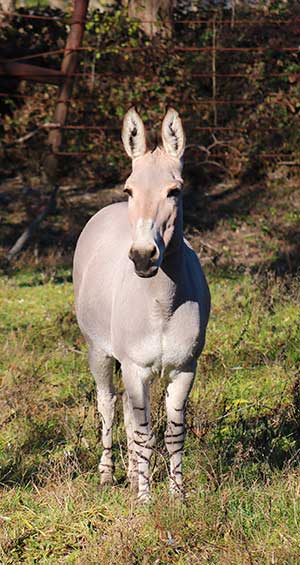Critically endangered Somali wild asses make exhibit debut at Franklin Park Zoo
Tuesday December 13, 2022
Visitors to Franklin Park Zoo can now see new furry faces on the Giraffe Savannah with the recent addition of the critically endangered Somali wild ass.
Franklin Park Zoo recently welcomed three female Somali wild asses to the animal family, and all are settling in well to their new home.
“Guests now have the rare opportunity to see these amazing animals in person as Franklin Park Zoo is one of only six institutions accredited by the Association of Zoos and Aquariums that house this species, and the only one in the Northeast,” said Chris Bartos, an Assistant Curator at Zoo New England’s Franklin Park Zoo. “These animals, which are noted for their distinct striped legs, are well adapted to survive in rugged habitats with a wide temperature range. Here at Franklin Park Zoo, guests will be able to see them exploring their outdoor habitat throughout most of the year.”

Somali wild asses are members of the horse family – Equidae, including horses, zebras and donkeys, and are native to the deserts and scrubland in Somalia, Somaliland, Eritrea and Ethiopia. Because these animals live in habitats with sparse resources, they don’t form large herds and are often solitary or in small groups. Wild asses differ from horses and zebras in their smaller size, larger ears and characteristically loud bray.
All wild equids—horses, zebras and wild asses—are threatened; however, the Somali wild ass, the smallest of the wild equids and the only one with striped legs, is critically endangered and faces an extremely high risk of extinction in the wild. There are less than a few hundred Somali wild asses left in their native habitat due to hunting, encroachment of humans/agriculture, and potential hybridization with domestic donkeys.
“We are thrilled to welcome these new additions to Franklin Park Zoo and to educate guests of all ages about this critically endangered species and the role it plays in helping to maintain a balanced ecosystem in its native habitat,” said John Linehan, Zoo New England President and CEO. “As one of the rarest equids in the world, these Somali wild asses serve as important ambassadors to further connect people to the incredible biodiversity of our planet, and through their story our staff will continue to share ways that we can all preserve and protect wildlife and habitats, now and in the future.”
Zoo New England participates in the Somali Wild Ass Species Survival Plan, which is a cooperative, inter-zoo program coordinated nationally through the Association of Zoos and Aquariums. SSPs help to ensure the survival of selected species in zoos and aquariums, most of which are threatened or endangered, and enhance conservation of these species in the wild.
Please note: While the Somali wild asses continue to adjust to their new habitat, they may not be seen on the Giraffe Savannah every day. They can be seen within their habitat as long as the weather is above 32 degrees and clear. As they are acclimating to their new home, they will not go outside in cold rain (below 40 and raining, or heavy rain).

